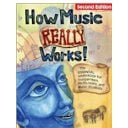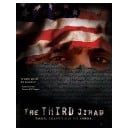
How Music Works
 We all respond to music - whether clicking our fingers, humming along or dancing - there's something out there for everyone. In this series Goodall looks at melody, rhythm, harmony and bass to establish how music is made and how it comes to reflect different cultures.
We all respond to music - whether clicking our fingers, humming along or dancing - there's something out there for everyone. In this series Goodall looks at melody, rhythm, harmony and bass to establish how music is made and how it comes to reflect different cultures.
Setting out on a journey that spans the globe and moves through the centuries, Goodall uncovers the elements that are shared by all styles of music. Following a trail of diverse musical talents from Mahler to David Bowie; the blues to Bulgarian folk songs; medieval choral music to disco; he reveals the tried and tested tricks of the composer's trade.
Melody - In this film composer Howard Goodall looks at melody's basic elements. Why are some melodic shapes common to all cultures across the world? Can successful melodies be written at random? If not, what are the familiar melodic patterns composers of all types of music have fallen back on again and again, and why do they work?
Rhythm - From the moment our hearts start beating, rhythm is integral to us all. From walking to dancing, from clicking our fingers to tapping our toes, we are all programmed to respond to rhythm. In this film Howard looks at the common rhythmic patterns that have been used by musicians from all cultures, from Brahms to rappers, from the founders of Cuban son to Philip Glass, from Stevie Wonder to Fats Waller.
Harmony - In the late middle ages western harmony started on a journey that would take it in a completely separate direction to that of the music of other parts of the world. It discovered chords, and, over the next seven centuries, began to unlock their harmonic possibilities. In this film Howard looks at how western harmony works, and how, in the present day, it has fused with other forms of music to create new styles.
Bass - For half a millennium instrument makers have been trying to construct instruments of all shapes and sizes capable of thudding, sonorous low notes. Only with the arrival of the synthesizer did they succeed in producing a rival to the mighty organ. With disco, dance, and drum 'n' bass, the bass has arrived centre stage.




You seem to have missed Brazilian music completely (samba is on the beat in odd measures, 1/16th ahead in even measures), choro sambada (the other way round) etc. There are at least a dozen song types there involving syncopated rhythms, and like in Cuba are a mix of African an European influences.
A real eye opener for anyone who likes music all the elements are there: The cultural history and the beauty of bass, rhytm, harmony and melody. Ive seen these programmes several times and I love music even more after seeing these programmes. Goodall is an amazing teacher.
Is this documentary alright for children? Say, grade 6?
The singer of Berlin's "Blue Skies" is Al Jolson. Search "Celebrating Star John Wayne with Al Jolson" in YouTube. I emailed Goodall's PA, who told me to contact the doco's producer, who in turn informed me. Enjoy! :-) Joseph in Auckland, NZ
This is a GREAT series - I wish I could buy it on DVD and play it for my music students! Is there anyway I can purchase it, even by download?
I can't say enough good about this fantastic series. Anyone who has even a basic appreciation for music should make the time available to watch this presentation. Well done Mr. Goodall.
This may be a few years old but should not be forgotten nor over-looked. I'm definitely picking up my guitar again & want to run out & buy a bass.
what an inspiring documentary- fascinating information and beautifully directed with lovely appropriate and original imagery- thank you!
Uhhhhh I'm pretty sure that the middle eastern women was singing in a Double Harmonic Scale, not a Pentatonic... They are not even remotely similar.
all of these doc's were so inspiring and artistic! I love the internet - without it I would never have come across all of this inspiration. could anyone watch these without smiling? =)
A great master class of music composition done in a fun and highly explicit way! Just a must see documentary for any person who chose music his profession.
I found this doc fascinating and oh so informative. Forty years of being a musician and Goodall takes so many things I knew just a little about, and melds them together in a few hours. I watched it three times in two weeks - twice with musician friends. What an excellent piece of work.
excellent ,one of the best music docs I've seen. but still haven't watched one that explains the entirety of music theory in the correct order, maybe that knowledge is harder to come by.
On topic: this documentary lost it when 1. the geezer sang about 'Christ' and 2. when he included that annoying twat 'Sting'.
He's not entirely wrong about music but I gots to disagree with some of the over-scripted simplifications re: melody. He also said absolutely nothing about rhythm!
The definition of musical 'modes' by the Greeks settled what ancient improvisers were reaching for all along with their few and narrow intervals.
Tempered tuning is well-modern compared to the history of music, but it newly allowed for the playing of music in all key signatures.
Learn some of these evolved music-theory rules - them break 'em... that's what makes good music! It really is so much better when a player is discovering an instrument! The brain instructs the fingers to repeat what the ears heard sounded right! All the theory in the world will be of no help unless the ear connects with brain and instructs the fingers!
Being a Zombie ain't much good either - to make music, you gots to have a soul!
Does anyone know the name of the celtic song 2 minutes into Part 5?
This brilliant doc was entertaining, educational, and funny. I had no music education (due to "music" being a "frill" in catholic school in the '50's.) The more I learn, the more I enjoy listening. This series touches on all types of music from classical to rap and more. Highly recommended!
great doc!,i loved this when it was on telly a few years back!
Does anyone know who did the rendition of "Blue Skies" by Irving Berlin in the first part of this documentary? I didn't even see it in the credits.
A thousand curses on you, Sony Music Entertainment.
yes i agree with Daniel. That would be VeRY interesting. Although I found this doc interesting and I do my best to educate myself with the theory of music I've always found it somewhat complicates and robotizes music. I'm sure music didn't start so complicated. It started with 2 people banging different rocks together and saying "That sound good!" I taught myself music through the same means. By playing what i thought sounded good, not by playing something in a way that i'm told will sound good. Through teaching myself music I found that I had already taught myself modes and scales and modified scales i had apparently came up with all on my own.
Don't get me wrong though, it's good to know the rules, it allows you to break them even further.
in my opinion i think if you want to become a musician you should let the music teach you first, then take lessons.
i'd like to see a doco exploring the myriad forms of underground avant gard black death ambient noise folk electronic industrial experimental which this doco pretends doesn't exist.
That cracks me up that the YT bot caught it for violation and I'd bet BBC licensed every clip they used, too.
what a wonderful journey .
really good doc, worth watching twice!
brilliant explained, but somehow still complex
These are only the basics of music theory...
But it's very well explained for those who are new to it.
nice docu!
vaughan williams piece is really good..
thanks so much V.
I know nothing about music theory either. Just when I think the guy is getting too complicated for me, he sums it up in a way that makes me get what he was saying. This is quite a fun info roller coaster for me!! Now I can understand my muso mates. Hooray! :D
I know literally nothing whatsoever about the technical side of music. This is really quite fascinating.
This is awesome.
@ tyrone: get some good speakers and a sub woofer! ;)
I really like that cross-rhythm. I'm making some on my drum machine
PS Thanks Vlatko
Thought I cant watch the hole program It is still a must see doc.
wonderful doco,.. thanks for access to this
@tyrone
its prob becaue most songs are equalized so that the bass isn't to loud, try dl your fav songs in flac format then use the graphic equalizer (winamp plays flac) to tune out the higher frequency of the other instruments that way you should be able to hear it. flac files are usually really big but the same technique will work for mp3 formats.
tyrone the bass is the boom boom boom so to speak the notes are deep i am a amature dj and know it takes time to truly disguinguish between different levels try listening to hard dance/ trance and bass will become very apparent :)
finally a documentary worth watching
YEAH MUSIC!!!
Could only watch 3parts from first episode, it appears that Sony Music Entertainment has blocked other parts in my country.
I was really looking forward watching those doc's :(
I would love to watch this with HD sound.
no matter how hard I try to focus on it in any song I can never hear the bass!! is it just something to develop?
BRILLIANT, puts the evolution of the scale patterns into context which personally is so valuable to me because to anyone who is self taught understanding that is precious information. i've always loved the blues and that interest drove me to understand the origin of the pattern through the cultural context of American history etc. but seeing the other systems in the same way was enlightening to me i've never though of it like that. irony is iv'e even seen this doc before!
Vlatko, I love this doc series. I haven't seen it for years, and I wish it were available for purchase. Thanks for posting it!
Anyone interested in music history or theory at all will enjoy this one. Many of the musical concepts are demonstrated with familiar popular music. (Plus it's British; so you know it'll have blues guitarists and the Beatles in there somewhere.)